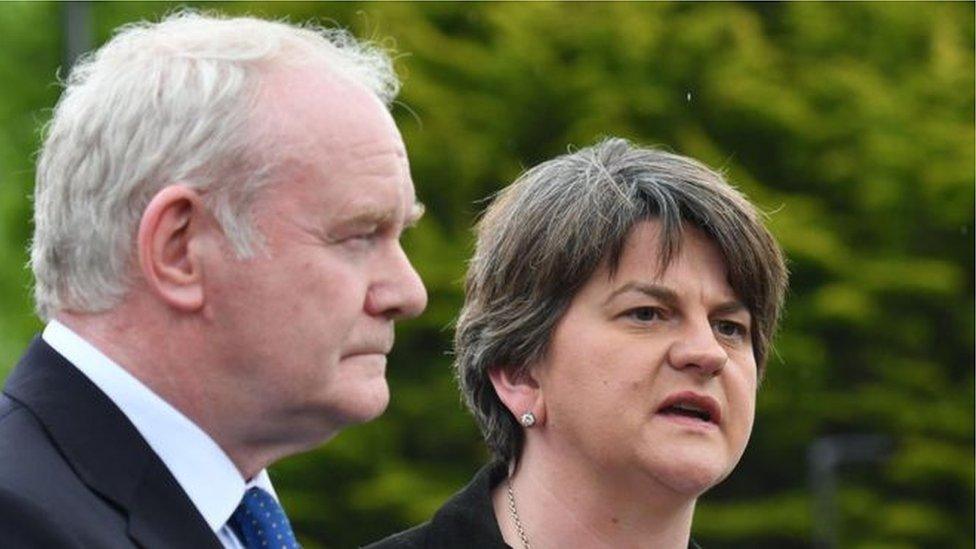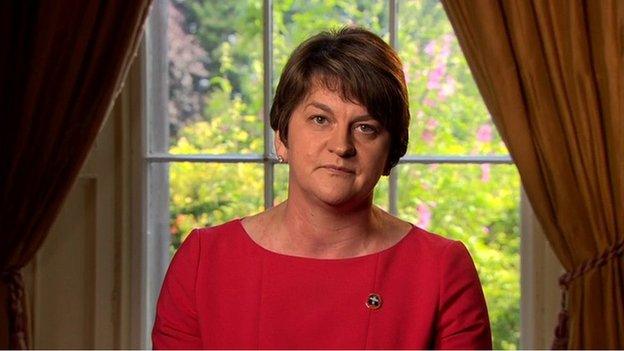Brexit: The 'reverse ferret' claims and Stormont's 'joint approach'
- Published

Martin McGuinness and Arlene Foster identified their five key priorities in the Brexit talks in a letter to Prime Minister Theresa May this week
"Brexit means Brexit" might have proved a catchy sound bite for Prime Minister Theresa May.
However this week's letter from Stormont Castle to Downing Street, external points to the huge ambiguity about what the UK might be entering into after it exits.
Stormont's First Minister Arlene Foster has weathered the opposition's cries of U-turn and "reverse ferret", external, arguing she is merely listening to those concerned about Northern Ireland's special circumstances.
However, her joint letter with Deputy First Minister Martin McGuinness does place her Democratic Unionist Party (DUP), at the very least, on the flexible wing of the Brexit camp.
Border checks
Voters who opted to leave the European Union because they did not want foreigners 'taking our jobs' might feel perplexed about fellow Brexiteers championing employers' continued access to both unskilled and highly skilled labour.
The Stormont Castle letter emphasises maintaining the current ease with which Northern Ireland trades with EU member states and the movement of people, goods and services across the Irish border.
Does that mean no customs tariffs within Ireland ? Or would Stormont settle for some kind of high-tech system for collecting tariffs over the internet, as opposed to physical checks on the border?
If the DUP is against any tariffs, then that would jar with Trade Secretary Liam Fox's reported preference for the UK to pull out of the European customs union.
If the party ends up favouring a Northern Ireland opt-out from some wider UK customs arrangements that might be hard to achieve, as well as ringing alarm bells with other pro-Brexit unionists like the Traditional Unionist Voice leader, Jim Allister., external
So Brexit may well mean one thing to some Brexiteers and quite another to others. Moreover, what politicians in Northern Ireland and across the UK aspire to is only one part of the equation.
Life rafts
The other is how much other EU members are prepared to offer, and how much they will listen to the particular concerns of the Irish government.
The Stormont letter to Downing Street concedes "the possibility that it cannot be guaranteed that outcomes that suit our common interests are ultimately deliverable".
This week, Westminster Business Secretary Greg Clark visited a factory on the outskirts of Belfast which manufactures life rafts.
Cue jokes about whether the UK will survive in the choppy waters it is now entering. Mr Clark was keen to emphasise these are early days and the government wants to hear perspectives from across the UK before finalising its negotiating position.
The Stormont letter reads like a shot across Downing Street's bows, with the Northern Ireland Executive making it clear it wants to be fully involved and will not be happy if London thinks simply keeping the Northern Ireland Office in the loop ticks that box.
Given that the prime minister is not intending to trigger Article 50 until sometime next year, Stormont politicians will have at least another two and a half years to debate their contrasting visions of our future relationship with Europe.
Different conclusions
As the courts decide what to do about legal challenges in both Belfast and London, some people, like the former MLA Brian Wilson, remain convinced that ultimately the UK will not leave the EU, external.
However, it is prudent that Stormont should start to develop a strategy for a development which has the potential to change so much that has been taken for granted on the island of Ireland.
Sinn Féin and the DUP will continue to draw very different political conclusions from the result of June's EU referendum.
But as Malachi O'Doherty points out in the Belfast Telegraph, external, once the cries of "DUP U-turn" die down, it might be considered a positive development that the first and deputy first ministers have begun to sketch out a joint approach to what will undoubtedly be difficult and complex negotiations.
- Published11 August 2016

- Published11 August 2016

- Published10 August 2016
